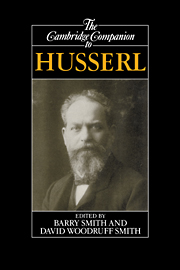3 - Meaning and language
Published online by Cambridge University Press: 28 May 2006
Summary
INTRODUCTION
Husserl pursued philosophy of language not for its own sake but mainly to support his conception of logic. In particular he wished to refute psychologism, the view that the laws of logic are descriptions of regularities in the way we think, which implies that different ways of thinking may embody distinct but equally acceptable logics. Husserl wishes instead to show there is a single logic which is objectively binding for all. This theory was propounded in the Logical Investigations (1900-01), which is where the greater part of Husserl's philosophy of language can be found. Prior to this, Husserl had mentioned language and meaning only in passing in the Philosophy of Arithmetic and in an early (1890) manuscript with the title “On the Logic of Signs (Semiotic)” which is mainly concerned with the division between natural signs (like smoke) and artificial signs (like language). This paper will accordingly focus first on the theory of meaning and language in the Logical Investigations, it will then consider the changes after 1901. These affect chiefly his view of the nature and status of meanings, which underwent a major modification between the Investigations and the Ideas. In comparison with other areas of his philosophy, however, Husserl’s views on language and meaning were relatively stable, and later developments arise primarily because of his elaboration of other issues adjoining the philosophy of language.
- Type
- Chapter
- Information
- The Cambridge Companion to Husserl , pp. 106 - 137Publisher: Cambridge University PressPrint publication year: 1995
- 24
- Cited by



